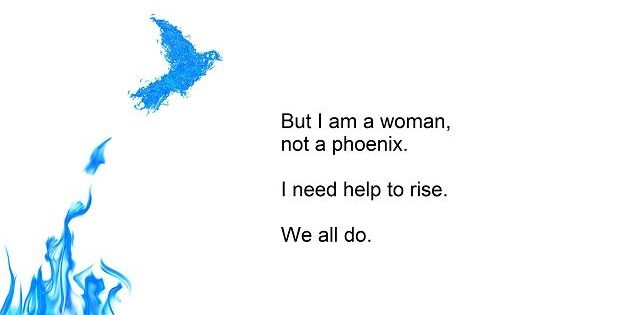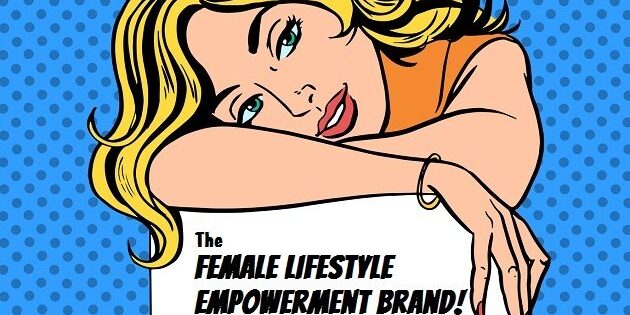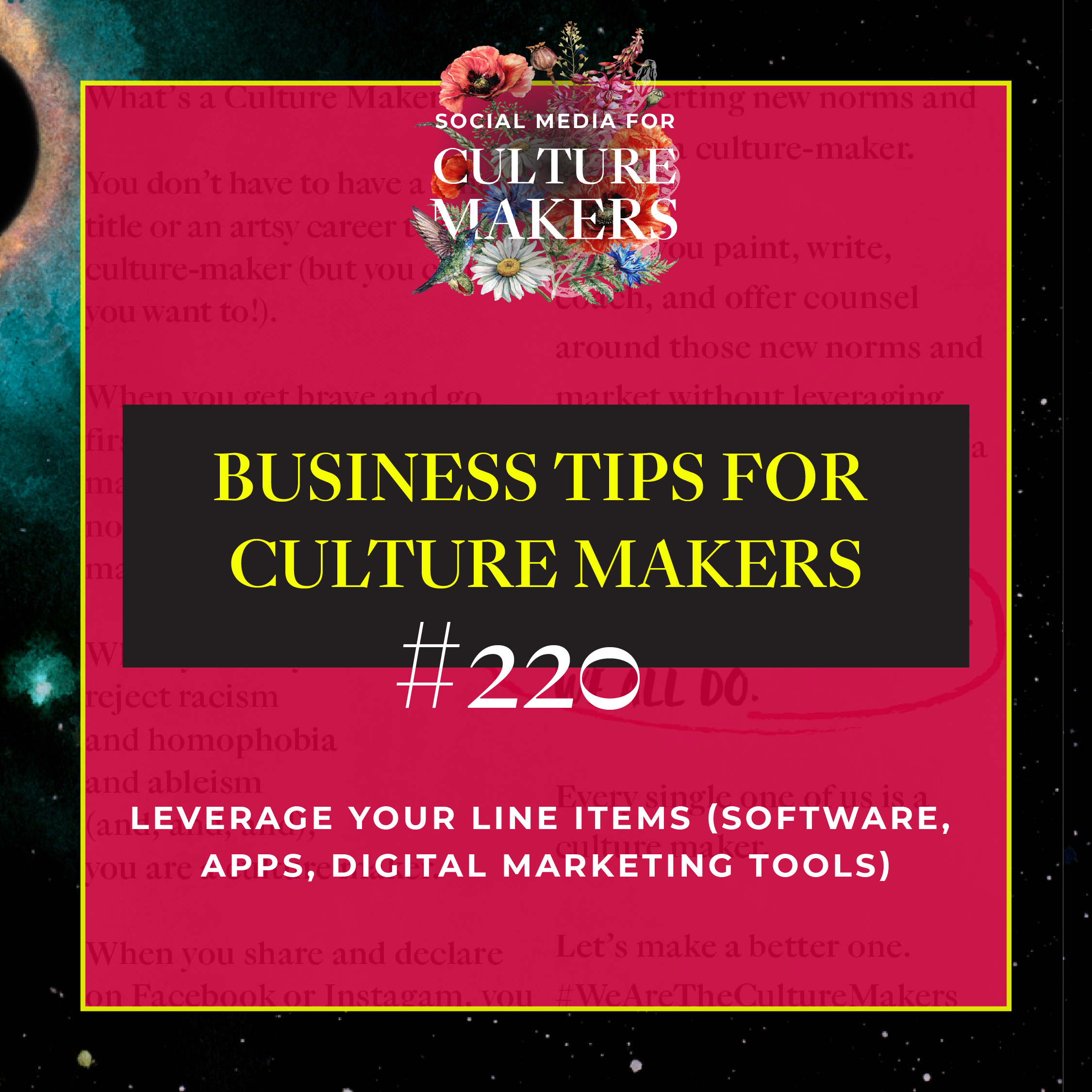
Business Tip for Culture Makers #220: Leverage Your Line Items (Software, Apps, Digital Marketing Tools)

Several years ago I was interviewed by Morra Aarons-Mele (Women & Work) for her Hiding In The Bathroom podcast and she told me about a recruiting agency founded by women.
The founders interview people at lunch and at coffee, which means they spend a lot of their business money in restaurants. To leverage that spend for #economicjustice, they specifically resolved to eat and entertain at restaurants owned by people with marginalized identities.
A lightbulb went off in my head.
I own an online company so most of my expenses are software & apps, not restaurants. Still, I can do what that HR agency did. I can leverage my line items. I can select my software providers based on functionality AND culture-making criteria.
If you’re an online business, there’s an opportunity here for you, too.
Let’s say you need a social media scheduler. You’re comparing three or four options for their functionality. You can also look at their team & org chart to see if there are people of colour and women in executive leadership positions (and, and, and).
You can make a list of things that matter to you and try to select providers that you WANT to invest in.
Leveraging what you’re already spending is a simple step with big impact. It helps us invest in our communities AND it builds culture-making business practices into the day-to-day structure of your business.
You can do this when you’re choosing new software AND you can review the existing providers in your business and see if they’re still the best fit (and iterate, iterate, iterate).
We have a lot of power — sometimes more than we even recognize — and this is one of the ways we can use it to grow ourselves and our communities.
A Practical Way to Leverage the Money You’re Already Spending in Your Business
One of my biggest expenses in my own business is apps and software, so it makes sense to me that I try, wherever possible, to use my tech budget for apps founded and led by BIPOC, women, feminists and people of non-dominant identities.
That’s how I turn my apps and software into deliberate culture-making decisions.
It’s one of the ways we invest in and grow our culture-making community (and an inclusive future!).
Marketing as a culture maker isn’t about theatrics or performance. It’s not about optics. It’s about our daily business practices — from what tech we use to which copywriting tactics we choose.
These companies don’t need to be flawless for me to choose these tools, (none are; this is capitalism; I’m trying to make the best choices possible in the system we have, not perfect choices) nor do they have to tick off every single one of my desired culture-making boxes…
…but they’re often so much better than their alternatives, both from a functional and community-impact perspective.
In the selection process — eg when I’m thinking I need an app or a software to solve a problem in my marketing or make it better — I use my culture-making criteria (is the team diverse? are there people of colour in executive leadership positions? are the founders and/or CEOs people with non-dominant identities? what are their labour policies?) as some of the required ‘features’ I’m looking for in a product.
I use a Selection Matrix to compare functions of the products/services I’m considering; it includes my inclusion criterion so I can make the best, most culture-making choice.
As with every purchasing decision, I might not get every feature and function I’m hoping for, but the more the better.
Get the Selection Matrix
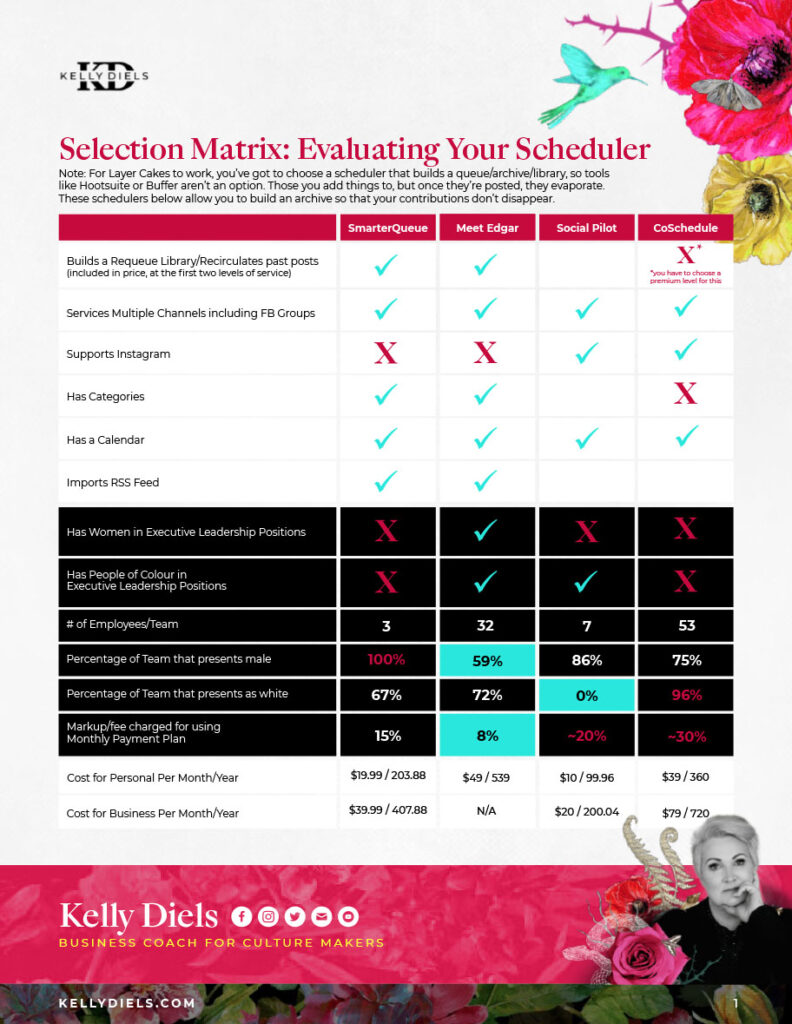
Side note: This is a sample Selection Matrix that I use. I regularly share it with my clients so they can implement this culture-making business practice in their platforms, too.
If you’d like to get a customizable, form-fillable pdf version of my Selection Matrix so you can use it to evaluate YOUR apps, you can sign up to get mine, here: https://kellydiels.com/selection-matrix/
In addition to the Selection Matrix, here are a few apps/digital tools that are also founded or led by BIPOC, women or feminists…
1) When you teach and sell online courses…
Hey Marvelous
Hey Marvelous is an online teaching platform where you can store your courses AND sell them.
Cool feature: it integrates with Zoom so after a live class, you don’t have to manually upload your recordings, which has been the bane of my existence.
Hey Marvelous is founded by two feminists, Jennifer Barcelos in the USA and Sandy Connery in Canada.
Lesson for Culture Makers:
Founders Sandy and Jenni declined Venture Capital from investors because it was going to distort their business model in ways they thought were destructive. So now, when they need to raise capital to finance the next round of product features, they hold low-cost workshops where they teach business skills to their user base and use that cash to cover development costs.
2) When you want to schedule social media…
MeetEdgar
MeetEdgar is a social media scheduler that saves and then republishes your posts so you’ve got an ever-growing archive of reusable media. Massive time saver.
MeetEdgar is founded by Laura Roeder (who cofounded B-school with Marie Forleo back in the day). The MeetEdgar team includes people of color in leadership positions and the team 60+ people is substantially diverse.
3) When you want to make it easy for clients to book time with you…
Calendly
Calendly is a scheduling app that integrates with your calendar. You give people a link and they can see when you’re available and book that time with you. (No more back and forth by email!)
Calendly is founded by Babatope (Tope) Awotona, a first-generation immigrant to the US from Nigeria; his company offers medical and dental coverage, flexible hours, work-from-home options, and “inclusive parental leave”.
4) When you want to create great-looking images…
Canva
I don’t have a lot of graphic design skill (none, really) and Canva makes it easy for me to put together polished images that I can quickly resize for the various platforms I use.
Canva is a bit of a unicorn, meaning it’s a company with a billion dollar valuation. Other unicorns include Google and Facebook — they’re so rare that they’re mythical creatures.
Even rarer in the realm of the unicorn: companies founded by women of colour. Women founders receive a paltry 2.2% of Venture Capital investments; the ratio is even worse when you break out the figures that apply to women of colour. According to reports from #ProjectDiane, in the last decade, startups led by black women received only .0006% of Venture Capital investment and Latinx founders received a paltry 0.32%.
Which makes the success of Canva, which was founded by Melanie Perkins, a young woman of colour from Australia, a truly remarkable story.
5) When you want to host events and sell tickets…
Eventbrite
I use Eventbrite frequently, mostly for in-person events but also for online events. It hosts an event description, collects payment, allows you to have applications/surveys, and sends reminder emails to registrants.
Eventbrite is cofounded by Julia Hartz who is also the CEO; Eventbrite won awards for having great workplace practices and culture.
6) When you want to STOP wasting paper on printed programs for your events…
Yapp
This one is a new discovery (h/t Misha Gallagher). Yapp is an app that attendees of your event/conference can download on their phones and follow the conference agenda, get additional notes/slides/resources and even connect with each other. You can also poll and survey people to get feedback on presentations and your event.
I like this a lot because it pains me to see 200 paper booklets left behind on tables after an event. That environmental waste can be prevented by using Yapp, Yapp was cofounded in 2012 by Maria Seidman.
7) When You Want to Build an Online Community but You Hate Facebook…
Mighty Networks
Mighty Networks is pretty robust, functionally, and way less addictive/noisy than Facebook so it’s a great place to host online groups, which is what it was specifically designed to do. Mighty Networks is founded and led by Gina Bianchi.
Want to use my Selection Matrix to evaluate YOUR apps and subscriptions?
Sign up to download your customizable Selection Matrix for free, here:
get the Selection Matrix
One more thing…
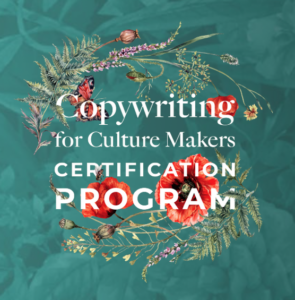 If making sure your MARKETING PRACTICES are aligned with your values is a non-negotiable for you…
If making sure your MARKETING PRACTICES are aligned with your values is a non-negotiable for you…
then you might find the Copywriting for Culture Makers Certification Program REALLY USEFUL.
It helps you build a new copywriting foundation on informed consent, shared values, vision, and deliberate ACTION.
(Quite a change from the status-quo copywriting that presses pain points, manufactures authority, fakes scarcity, leverages privilege, and deliberately triggers unconscious buying.)
Interested in Copywriting for Culture Makers? I invite you to check it out and learn more, here.
You might also like these related posts:
- Business Tip for Culture Makers #1025: Invest In Your Community
- Hire them When They’re Hungry. Hire them On Their Way Up.
Are these Culture Making Business Tips & Tools useful in your business? You can find more, here.


